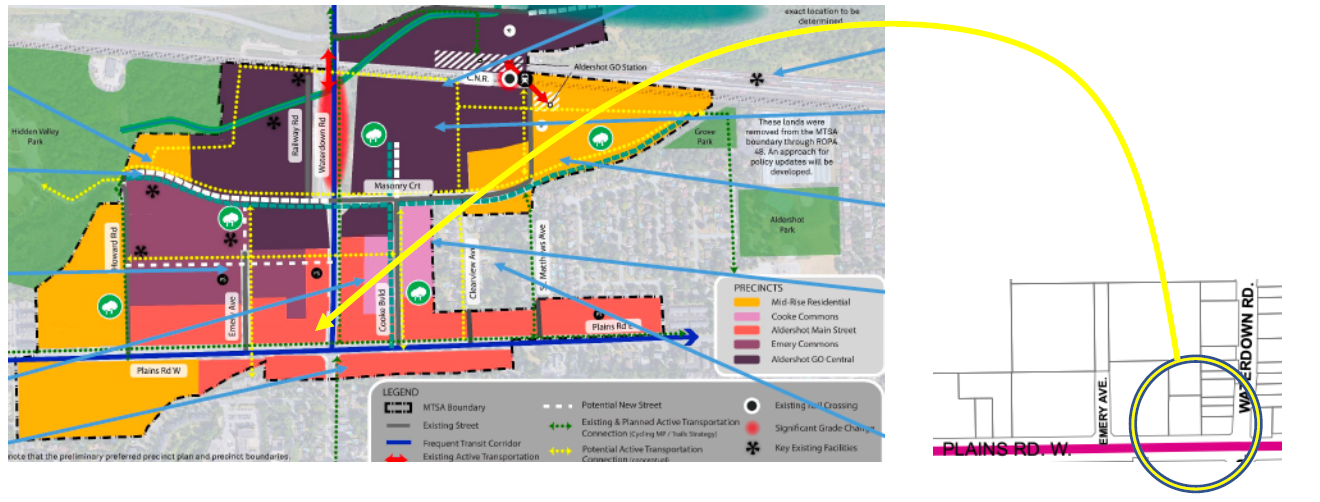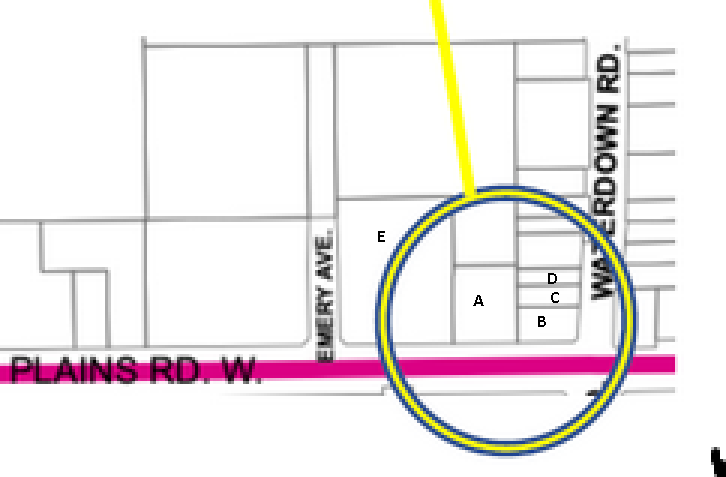 By Pepper Parr
By Pepper Parr
October 19th, 2022
BURLINGTON, ON
In February of this year Councillor Kelvin Galbraith met with the Burlington Integrity Commissioner to seek advice on any Conflicts of Interest he might have.
In March of this year the Integrity Commissioner gave Councillor Galbraith the following advice:
,This is in response to our conversation and your inquiry of February 24, 2022 regarding whether you might have a conflict of interest if you participate in consideration of planning changes affecting properties you own within the area known as the Major Transportation Study Area (MTSA) for the Aldershot GO, in Burlington.
You have advised that you own two properties along Waterdown, 1016 and 1018 Waterdown Road and one property located at 15 Plains Road West from which you operate your business, The Fitness Firm.
These three properties effectively book-end, abutting at the rear, the property which sits directly at the corner of Waterdown and Plains Roads.
You have advised that the two Waterdown Road properties were formerly residential dwellings, which were removed a number of years ago, and that your future plans include integrating them into a larger development through land assembly.
The relationship of your properties relative to the MTSA Aldershot Hub area as presently delineated is depicted on the following map view:

The Integrity Commissioner provided a map to help explain specifically where the Conflicts are.
If we have omitted or incorrectly stated any material facts please advise as it may cause us to alter our advice to you.
In order to fully understand the potential land assembly we have enlarged a part of the map.

A is the location of the Galbraith Fitnes Firm, B is the garage at the intersection that Galbraith does not own, C and D are properties that Galbraith acquired and E is a Tim Hortons location within a small plaza.
Advice
Municipal Conflict of Interest Act
As a Member of the Council you are subject to subsections 5(1) and 5(2) of the Municipal Conflict of Interest Act (“MCIA”) Those sections require that you not take part in discussions or voting on a matter, or attempt in any way before, during or after a meeting, to influence the voting on a question related to the matter when you have a direct or indirect interest in the matter. Those sections also require you to disclose the general nature of the interest, and where the matter under consideration takes place in a forum not open to the public, to not be present.
The relevant provision is as follows:
- (1) Where a member … has any pecuniary interest … in any matter and is present at a meeting of the council … at which the matter is the subject of consideration, the member,
- shall, prior to any consideration of the matter at the meeting, disclose the interest and the general nature thereof;
- shall not take part in the discussion of, or vote on any question in respect of the matter; and
- shall not attempt in any way whether before, during or after the meeting to influence the voting on any such question.
A matter which has likely financial impact (positive or negative) on your own property constitutes a pecuniary interest to you.
Planning Notice as an indication of financial impact
Proximity to a property under consideration is a ‘flag’ to members of Council, to stop and consider whether they may have a conflict of interest in participating in the matter. Distance alone is not the determining fact, but can be used as a reasonable ‘rule of thumb’ to determine potential for a possible financial impact arising from development applications.
With respect to the determination of a specific distance beyond which a member of council who owns a property would not be considered to have a conflict of interest, although there are no hard and fast rules, we consider that the distance utilized for Notice under the Planning Act provides reasonably good guidance for determining the appropriate distance beyond which impact might be considered ‘remote and insignificant’ for most planning and development applications.
Your properties all fall clearly within the area being contemplated as the study area, and which will be subject to policy amendments to support and guide future development under the relevant official planning document.
Sometimes, where a member of council owns a property which is within an area affected by a decision of council, that member may be deemed to have an interest in common. This may be the case where the member’s property, although likely to be affected by the decision, will be no differently affected than hundreds of other similarly-situated properties.
Interest in Common
Section 4(j) of the Municipal Conflict of Interest Act (MCIA) provides an exception for a member’s interest where the pecuniary interest is an interest in common with electors generally. In relevant cases the duty to comply with s. 5, MCIA, to declare and refrain from participating and voting, does not apply.
“Interest in common” as used in section 4(j) has been interpreted by the Courts in such a way that the interest need not be an interest in common with all electors of the municipality, but can be an interest in common with all other similarly situated residents.
For example, where all residents of a particular area would be impacted by a particular council decision, and the individual member’s interest is no different from the other affected electors who resided in the same area,1 that too would be considered to be an interest in common.
This reasoning of “interest in common” was applied by the court in Murphy v. Foster, where a member of council participated in and voted on a decision to designate an area of environmental protection in a new official plan, making it more difficult to obtain development approval on lands adjacent to the subdivision where that member owned property. The member was found to have an interest in common.
It should be noted that where the courts have found that the pecuniary interest is different not by degree, but by nature (kind) from that of the other ratepayers in the area under discussion, it will be more difficult to find an “interest in common”. An example we often use is the example of a gravel road hard-topping (road paving) program which affects, say, one hundred properties in the same manner, varying the actual property value impact of the paving program on the abutting properties only by the width of the frontage involved. Regardless of the actual dollar-value impact, each of those 100 properties would have an interest in common, varying only by degree. If one of those properties, however, were required to have a sliver of frontage expropriated for the paving, that property interest would differ in kind and the interest in kind exception would no longer be available.
Cases which differentiate a member’s property interest as distinguishable from other property owners affected, found that the member stood to benefit in a particular manner, through development of property which would flow as a result and by virtue of the council decision, and therefore the interest was not an interest in common.2
Based on the original map of the study area, which merely delineated the boundary of the MTSA Aldershot GO area but did not identified any proposed changes to the land uses, it would have been reasonable to consider your interest as an interest in common. However, in light of the more granular level of detail now under review, which includes proposed changes to land uses which have a direct affect on the potential uses for your properties, and which will affect your properties differently –in degree and in nature – from other properties throughout the study area, we would not consider your interest to be an interest in common any longer. This is underscored by the fact that two of your properties are, in fact, vacant and you are awaiting planning changes to enable redevelopment, with possible land assembly to enhance the opportunities. It would be reasonable to characterize you as an investor in the area, whose investment return will be realized through redevelopment, and for this reason, your interest could not properly be considered an interest in common.
Remote or Insignificant:
While it is often relevant to consider whether an interest could be considered “remote or insignificant” as referenced in the MCIA, s. 4(k), we would not consider this exception to be relevant in your circumstances. The applicable test to determine whether a member has an interest that is so remote or insignificant in its nature such that it cannot reasonably be regarded as likely to influence the member is set out in Whiteley v. Schnurr (1999), 4 MPLR (3d) 309. The question to be asked is as follows:
Would a reasonable elector, being apprised of all the circumstance, be more likely than not to regard the interest of the councillor as likely to influence that councillor’s action and decision on the question?
In many of the cases determining a councillor’s pecuniary interest to be remote and insignificant, the interest arises out of an indirect pecuniary interest resulting from the pecuniary interest of a member of the councillor’s family, business relationships or other memberships. In the current circumstances, because the interest arises from your ownership of three properties within the study area, two of which are destined for redevelopment which the re-designations will enable, a pecuniary interest for you would not be considered remote or insignificant.
Accordingly, we conclude that, now that the plans include reference to proposed designations affecting your properties, you are required to recuse yourself from the discussion and voting on consideration of the Aldershot GO MTSA. This includes refraining from participating and attempting to influence the outcome during the open house and other occasions at which the public, staff and Members of Council are contemplating proposed policies affecting the Aldershot GO MTSA.
Any time consideration of the matter is before Council or any of its committees, your specific declaration might go something like this:
As the owner of several properties within the study area which will be affected by the proposed land use designations being contemplated, I have a pecuniary interest and will be recusing myself from participating in or voting on this matter.
Footnotes:
1 In Re Ennismore (Township) where a decision to build a communal water supply system affected an area of the township, and the council member had a commercial establishment in the study area, his pecuniary interest was an interest in common; even though his interest was affected to a greater degree, it was not different in kind from other affected electors.
2 Graham v. McCallion, 1982 CanLII 2014 (ON SC); Re Greene and Borins, 1985 CanLII 2137 (ON SC); Jafine v. Mortson, 1999 CanLII 14775 (ON SC).
We would be pleased to discuss our advice with you at your convenience.
Related news stories:
What the Aldershot MTSA is all about and what can be built within the boundary.














